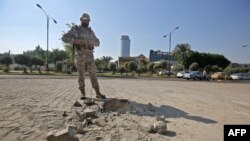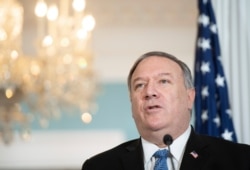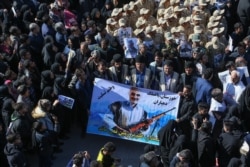This week, two Iran-backed militias in Iraq denied responsibility for a rocket attack Sunday on the U.S. embassy in Baghdad.
The groups are the usual suspects when American interests come under attack in Iraq and it’s rare for them to publicly deny carrying out an attack on a U.S. target.
But after Sunday’s incident, which saw several small rockets land inside Baghdad’s fortified Green Zone, wounding at least two Iraqi civilians, both of the Iranian proxy groups released statements denying any role.
The most prominent Iran-backed group, Kataib Hezbollah (KH), went a step further by condemning the attack as “indiscriminate."
“The bombing of the embassy of evil at this time is an uncontrolled act, and the relevant authorities should follow up and arrest the perpetrators,” said KH in a statement published in local Iraqi media Monday.
“We condemn the indiscriminate shelling of the military barracks of the American Embassy because it is a real threat to civilian lives,” it added.
U.S. Secretary of State Mike Pompeo blamed the attack on pro-Iran Shi’ite militias, calling for the support of Iraqi people in “their government’s efforts to reinforce Iraq’s sovereignty.”
“The same militias targeting diplomatic facilities are stealing Iraqi state resources on a massive scale, attacking peaceful protesters and activists, and engaging in sectarian violence,” said Pompeo, adding that no Americans were harmed.
Iraqi Prime Minister Mustafa al-Kadhimi this week called the attack an act of terror, declaring that a number of suspects had already been arrested.
“Yesterday’s bombing of the Green Zone is a cowardly act of terrorism, and the missiles landed on Iraqis and wounded them, and we will not accept any attack on diplomatic missions,” he said.
Fear of retaliation
While describing attacks on U.S. military installations as legitimate, Qais Al-Khazali, the leader of anti-American Asa'ib Ahl al-Haq, said in a statement that his forces will not assault diplomatic missions.
“Targeting the bases of the American occupation is a right guaranteed by the divine laws and the laws of Earth, and we will not stop until our country is liberated,” said Al-Khazali, who was once a U.S. military detainee in Iraq.
While it is not unprecedented for Iranian proxy groups to deny attacks that cause civilian casualties, observers say the explicit nature of condemnation by a group such as KH appears to show the militants are concerned about shaping public perception of the attacks, and their vulnerability to U.S. airstrikes from the outgoing Trump administration.
“The Fasail [factions] want to avoid retaliation for their actions, so they create fake front organizations (like Jabbarin) and publicly denounce the attacks. They are hoping to create doubt that will allow them to keep attacking,” said Michael Knights, an Iraq analyst at the Washington Institute for Near East policy.
The attack appeared to increase fears among Iraqis that further instability might face their country ahead of the anniversary of the January 2020 U.S. drone strike that killed Iranian military commander Qassem Soleimani. Militia leader and KH founder Abu Mahdi al-Muhandis was also killed.
“We are concerned about the current transition in the world and any mistake in the rules of conflict could lead to escalation. Iraq and the Iraqis want to spend Christmas nights in peace and security as they enter the new year,” Hussein Ali Allawi, a professor of national security at Nahrain University in Baghdad, told VOA via a messaging app.
Following the U.S. killing of Soleimani and al-Muhandis, the Shi’ite-controlled Iraqi parliament passed a nonbinding resolution that asked for the removal of U.S. troops and other foreign forces. Since then, Iran-backed militias also have occasionally carried out attacks against U.S. diplomatic facilities and military installations in Iraq.






